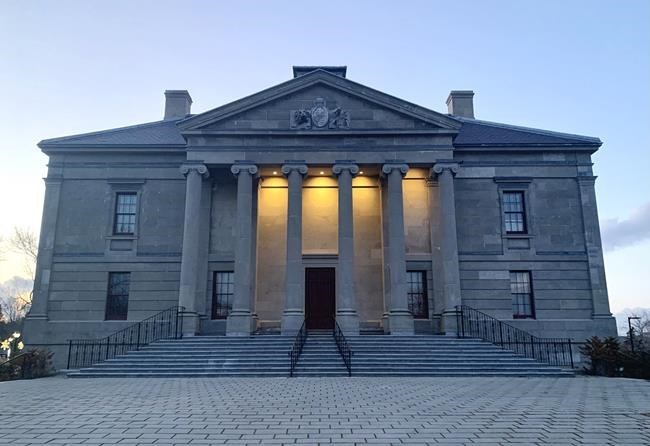ST. JOHN'S, N.L. — As Newfoundland and Labrador considers a name change for its historic Colonial Building in downtown St. John’s, an Indigenous leader in the province says it’s an opportunity to revisit the province’s Confederation with Canada.
Chief Mi'sel Joe of the Miawpukek First Nation says the province’s Indigenous groups are still struggling after being left out of the province’s terms of union with Canada when it joined the country in 1949. The omission denied Indigenous groups federal recognition and hence access to federal services and programs for decades, he said.
"I tell people all the time, I was not born in Canada, I was born in a colony run by the British government," Joe, 74,said in a recent interview. "When Newfoundland joined Confederation, nobody asked our people if that's what we wanted."
The current name of the neoclassical building that stands next to a popular park in downtown St. John's "signifies colonialism" and the influx of European settlers to Newfoundland, Joe said. First opened in 1850, the building housed the colonial government, and later the provincial legislature for the first 10 years after Newfoundland joined Confederation.
A renovation project to turn the pillared, limestone Colonial Building into a public museum and tourism destination began over a decade ago, and Tourism Minister Steve Crocker has said the aim is to have the work completed in time for this summer's Come Home Year festivities, in which the province is encouraging Newfoundlanders and Labradorians who've moved away to return home for a visit.
A Nov. 17, 2021, information note from the provincial Tourism Department first obtained by CBC News discusses "the need and process" to rename the building, "as part of (the government’s) ongoing efforts in support of Indigenous reconciliation and in keeping with current public sentiment/discourse surrounding the concept of colonialism."
The note suggests Parliament House or House of Parliament as possible alternatives.
Joe said a name change is a "move in the right direction" and that the issue came up last week during a regular meeting held between Premier Andrew Furey and the province's Indigenous leaders.
Kelly Anne Butler, an Indigenous education specialist at Memorial University, created and taught a course about Newfoundland and Labrador's terms of union with Canada and its impacts on Indigenous people. She agrees that discussions about the Colonial Building present an opportunity for the province to re-examine Confederation.
"Indigenous Peoples often have a very different experience of the history of this province than what is portrayed in tourism brochures," Butler said in an interview Tuesday.
The dominant narrative around Confederation — one of industrious campaigner Joey Smallwood capturing the support of Newfoundlanders in his quest to join Canada and become the province's first premier — doesn't include the lasting impact of Smallwood's negotiations with Canada on Indigenous people, she said.
Butler said Indigenous communities were erased from the terms of union with each successive draft of the document, ultimately leaving them without federal or provincial recognition. Negotiations like the ongoing treaty discussions between Ottawa and Labrador's Innu Nation, or the establishment of Labrador's Inuit Nunatsiavut government in 2005, are all happening in more modern times because they didn't happen in 1949, she said.
Premier Andrew Furey told reporters Tuesday he welcomes these discussions, adding the renovated Colonial Building will include a special room dedicated to the history of Indigenous people in the province.
"We can't hide from our previous history," Furey said from Ottawa. "Part of reconciliation is understanding our past and creating a new path forward."
As for rewriting the terms of union to include Indigenous groups, Joe said he's hopeful. "That's going to be the call of both levels of government."
This report by The Canadian Press was first published March 16, 2022.
Sarah Smellie, The Canadian Press



